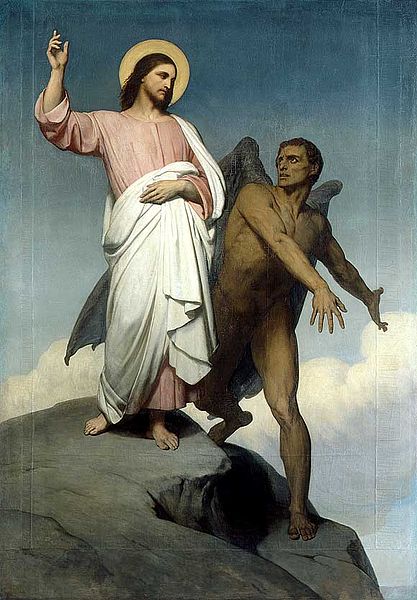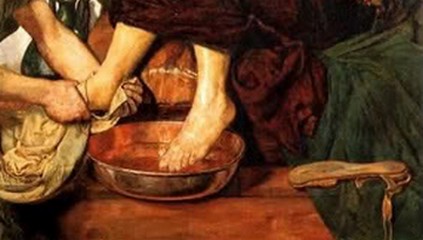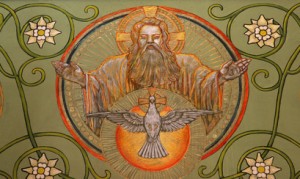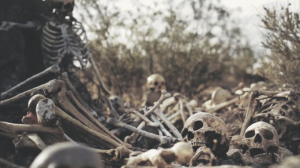====================
A sermon offered by the Rev. Dr. C. Eric Funston on the First Sunday in Lent, February 14, 2016, to the people of St. Paul’s Episcopal Church, Medina, Ohio, where Fr. Funston is rector.
(The lessons for the day are Deuteronomy 26:1-11; Psalm 91:1-2, 9-16; Romans 10:8b-13; and St. Luke 4:1-13. These lessons may be found at The Lectionary Page.)
====================

If you would enter
into the wilderness,
do not begin
without a blessing.Do not leave
without hearing
who you are:
Beloved,
named by the One
who has traveled this path
before you.Do not go
without letting it echo
in your ears,
and if you find
it is hard
to let it into your heart,
do not despair.
That is what
this journey is for.I cannot promise
this blessing will free you
from danger,
from fear,
from hunger
or thirst,
from the scorching
of sun
or the fall
of the night.But I can tell you
that on this path
there will be help.I can tell you
that on this way
there will be rest.I can tell you
that you will know
the strange graces
that come to our aid
only on a road
such as this,
that fly to meet us
bearing comfort
and strength,
that come alongside us
for no other cause
than to lean themselves
toward our ear
and with their
curious insistence
whisper our name:Beloved.
Beloved.
Beloved.
That is the poem Beloved Is Where We Begin by Jan Richardson from her collection of verse entitled Circle of Grace. It speaks to us of the gospel story we have just heard; it speaks to us as we begin our Lenten journey. We know the story – we know that this “whispered name” is what Jesus heard right before, “full of the Spirit,” he was led into the desert: “You are my Son, my Beloved. In you I am well pleased.”
Today’s Old Testament lesson from the Book of Deuteronomy was clearly chosen to make the connection between the Hebrews’ forty years of wandering and Jesus’ forty days in the desert, between their celebration by feasting and his time of fasting. In Year A of the Lectionary cycle, however, we are asked to consider Genesis 3 and the “fall” of Adam and Eve, their giving into the serpent’s temptation to eat of the fruit of the tree of knowledge. I suspect that, when most of us think of temptation, it is that story we most often recall.
You may remember a few weeks ago, when we heard the story of Jesus’ baptism, that I read you the genealogy which Luke places between that story and this tale of his time in the desert. That Luke closed the baptism story and introduces the temptations by tracing Jesus’ descent from Adam, suggests that Luke is thinking of the Garden of Eden story, as well. Perhaps Luke is making the point that, like the temptation of Adam and Eve, the temptations put before Jesus had very little to do with a power grab by Satan and almost everything to do with playing on human feelings of insecurity and mistrust.
This is also true, however, of the Hebrews’ forty-years journey through the wilderness of Sinai. They, too, faced desert insecurities during those four decades and those temptations were parallel to those offered Jesus. Like Adam and Eve, the first temptation offered Jesus is one of food, playing human insecurity around nourishment and food, both physical and spiritual. The wandering Hebrews, too, faced that anxiety. Remember that they complained of Moses: “If only we had died by the hand of the Lord in the land of Egypt, when we sat by the fleshpots and ate our fill of bread; for you have brought us out into this wilderness to kill this whole assembly with hunger.” (Ex 16:3)
The second temptation of Jesus, the offer of lordship over all the kingdoms of the earth, is less about being a ruler and more about simply being recognized; it is the insecurity of identity, of being known to one’s fellow human beings. In the wilderness of Sinai, the Israelites again railed against Moses, “Why did you bring us out of Egypt, to kill us and our children and livestock with thirst?” (Ex 17:3) They were afraid that they would all parish and that no one would remember them, that their existence and their identity would be forgotten.
The third temptation addresses the human insecurity of support, the human need for reassurance that God cares. “If you are the Son of God, throw yourself down from the pinnacle of the Temple; surely God will command his angels will save you!” says Satan. The Hebrews at the foot of Mt. Sinai, when Moses was delayed for 40 days and 40 nights, began to feel that same insecurity; they begged Aaron to make them a god. He did, a Golden Calf, before which they danced and felt reassured. (Ex 32)
Forty days and nights on the mountain, forty years on the desert journey, forty days in the desert . . . Why the forty days? I’ve read that whenever we see “forty” in the Holy Scriptures what it is really saying to us is “this lasts as long as it takes for us to figure this thing out.” It means “as long as it takes for you to hear that word, ‘Beloved,’” “as long as it takes for you to know that the one who loves you will not abandon you, will not leave you without nourishment, will not let you cease to be as if you had never existed, will not fail to care for you and support you.” As long as it takes.
The 17th Century French philosopher Blaise Pascal described human beings as having what he called a “God-shaped hole,” not a flaw, but rather a natural yearning, “the empty print and trace” of a true happiness that once was there, an “infinite abyss” that can only be filled by God. (Pensees, 10:148) Similarly, St. Augustine of Hippo, the 4th Century African bishop, in the first lines of his Confessions, wrote that “our hearts are restless till they find their rest in God.” (1.1.1) Based on such insights, Lutheran theologian David Lose has suggested that before there was “original sin” there is “original insecurity.” He writes, “Adam and Eve are tempted to overcome that original insecurity not through their relationship with God but through the fruit of the tree of the knowledge of good and evil, fruit that in that moment looks to be shaped just like their hole.” The Hebrews in the desert of Sinai thought that the soup kettles and stew pots of Egypt would fill the hole, or that water from a desert spring would fill the hole, or that a Golden Calf cast from their earrings and necklaces would fill the hole. Satan tried to convince Jesus that bread made from stones, or rulership of the world’s nations, or the ability to fly like Superman, held up by the angels, would fill that hole.
Over and over again in human life, the devil attempts to sow mistrust: you may go hungry; you may not be recognized and appreciated; you cannot trust God to sustain and care for you. In the wilderness, Jesus replies with Scripture, not because life’s challenges can be answered by remembering or quoting Bible verses but because Jesus finds in Scripture, as we can, the words to give voice to his trust in the Father. At the core of each reply is Jesus’ absolute trust in God for spiritual and physical nourishment, for identity and ministry, for support and care.
And where does Jesus find that? Just where the Hebrews ultimately found it. For them, the nourishment, identity, and support were not, ultimately, found in a homeland; they were found where God had put them, in their hearts. Looking for security outside themselves, they failed to see it inside. Over and over again the security they longed for was offered to them, well before they entered the Promised Land. Manna falling from the sky, miraculous springs of water opening to assuage their thirst, rules to live by offered on Mt. Sinai – these weren’t just sign-posts pointing to the promise. They were and are the promise! The Hebrews were looking for a home, a Promised Land which would sustain and support them. But they had that all along. God was their home, their sustenance, their support.
Unlike the Israelites, Jesus knew that all along. Luke drops this short phrase into the story – “full of the Holy Spirit.” Jesus is filled with the Holy Spirit and, thus, able to respond with steadfast sureness and faith when tempted by the Devil. Every one of us knows how hard it is to resist temptation; the world (if not the Devil) plays on our insecurities all the time! Jesus being filled with the Holy Spirit in the desert was not an isolated or special thing, a temporary truth for him alone; it is a promise for us. It is a promise that has been for all of God’s People since the beginning and will always be, for Adam and Eve, for Moses and the Israelites, for you, and for me.
That insecure, yearning hole in the middle of our existence is already filled, we just need to realize that! For the next forty days, or the next forty years, or as long as it takes, we need to come to the recognition that that “God-shaped hole” is already “filled with the Holy Spirit,” that the Lord has always been our refuge, to come to the knowledge that the Most High has always been our habitation, to understand that we are filled with the Holy Spirit, and to know those
strange graces
that come to our aid . . . .
that fly to meet us
bearing comfort
and strength,
that come alongside us
for no other cause
than to lean themselves
toward our ear
and with their
curious insistence
whisper our name:
Beloved.
Beloved.
Beloved.
Amen.
====================
A request to my readers: I’m trying to build the readership of this blog and I’d very much appreciate your help in doing so. If you find something here that is of value, please share it with others. If you are on Facebook, “like” the posts on your page so others can see them. If you are following me on Twitter, please “retweet” the notices of these meditations. If you have a blog of your own, please include mine in your links (a favor I will gladly reciprocate). Many thanks!
====================
Father Funston is the rector of St. Paul’s Episcopal Church, Medina, Ohio.
 Every year on Maundy Thursday in the Episcopal Church we do this thing: we gather for Eucharist and we hear these lessons – the story of the Passover from the Book of Exodus, St. Paul’s retelling of the institution narrative of the Eucharist, and St. John’s story of the Last Supper in which he focuses not on the meal but on Jesus’ act of humility and service during the meal (probably quite early in the evening) of washing the feet of the others present.
Every year on Maundy Thursday in the Episcopal Church we do this thing: we gather for Eucharist and we hear these lessons – the story of the Passover from the Book of Exodus, St. Paul’s retelling of the institution narrative of the Eucharist, and St. John’s story of the Last Supper in which he focuses not on the meal but on Jesus’ act of humility and service during the meal (probably quite early in the evening) of washing the feet of the others present. The four evangelists are traditionally represented by iconic depictions of the emphasis of their gospels. John, whose gospel is the longest and most different of the four tellings of Jesus’ story, is represented by an eagle because he emphasizes the divinity of Christ. Matthew, on the other hand, begins his gospel with Jesus’ genealogy and emphasizes the humanity of the Savior, so he is represented by a man. Luke emphasizes the sacrificial nature of Jesus’ ministry and mission; thus, he is represented by an ox or bull (often winged), the sort of animal offered in the Temple.
The four evangelists are traditionally represented by iconic depictions of the emphasis of their gospels. John, whose gospel is the longest and most different of the four tellings of Jesus’ story, is represented by an eagle because he emphasizes the divinity of Christ. Matthew, on the other hand, begins his gospel with Jesus’ genealogy and emphasizes the humanity of the Savior, so he is represented by a man. Luke emphasizes the sacrificial nature of Jesus’ ministry and mission; thus, he is represented by an ox or bull (often winged), the sort of animal offered in the Temple. Today is the Third Sunday in Lent but, being March 8, it is also the day set aside on the calendar (both that of the Church of England and that of the Episcopal Church) for us to remember a hero of the Anglican tradition, a World War I chaplain named Geoffrey Anketell Studdert-Kennedy. In 1914 he became the vicar of St. Paul’s, Worcester, UK, but a short while later, on the outbreak of war, Kennedy volunteered as a chaplain to the armed forces. He gained the nickname “Woodbine Willie,” for his practice of giving out Woodbine brand cigarettes to soldiers. In 1917, he won the United Kingdom’s Military Cross for bravery at Messines Ridge.
Today is the Third Sunday in Lent but, being March 8, it is also the day set aside on the calendar (both that of the Church of England and that of the Episcopal Church) for us to remember a hero of the Anglican tradition, a World War I chaplain named Geoffrey Anketell Studdert-Kennedy. In 1914 he became the vicar of St. Paul’s, Worcester, UK, but a short while later, on the outbreak of war, Kennedy volunteered as a chaplain to the armed forces. He gained the nickname “Woodbine Willie,” for his practice of giving out Woodbine brand cigarettes to soldiers. In 1917, he won the United Kingdom’s Military Cross for bravery at Messines Ridge. What is Lent all about?
What is Lent all about? “Life is a banquet, and most poor suckers are starving to death!”
“Life is a banquet, and most poor suckers are starving to death!” 
 As Mark constructs his version of the story of Jesus, the Lord has just advised his followers to cut off body parts that might cause them to sin saying it is better to enter Heaven maimed than to be thrown into Hell where “the fire is never quenched.” To this admonition, then, Mark adds this statement about salt.
As Mark constructs his version of the story of Jesus, the Lord has just advised his followers to cut off body parts that might cause them to sin saying it is better to enter Heaven maimed than to be thrown into Hell where “the fire is never quenched.” To this admonition, then, Mark adds this statement about salt. Let’s just do a bit of bible study today. I think we’ll see a common theme in the three lessons.
Let’s just do a bit of bible study today. I think we’ll see a common theme in the three lessons. He has kicked the bucket, cashed in his chips, shuffled off this mortal coil, gone the way of all flesh, croaked, gone home, passed away, turned up his toes, ridden the pale horse, fallen off his perch, taken his last bow, entered larger life, joined the choir invisible.
He has kicked the bucket, cashed in his chips, shuffled off this mortal coil, gone the way of all flesh, croaked, gone home, passed away, turned up his toes, ridden the pale horse, fallen off his perch, taken his last bow, entered larger life, joined the choir invisible.

